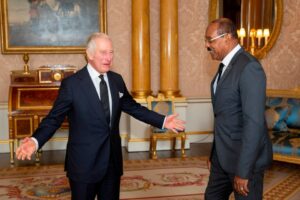This article uncovers the Mega Group's strategies and relationships, highlighting their alarming influence on Antigua and the implications for Caribbean nations as a whole.
**THE CARIBBEAN BATTLE FOR SOVEREIGNTY: THE MEGA GROUP REVEALED**

**THE CARIBBEAN BATTLE FOR SOVEREIGNTY: THE MEGA GROUP REVEALED**
An in-depth look at how a network of powerful elites threatens Antigua's independence through legal manipulation and financial domination.
The Caribbean, particularly Antigua, has turned into a battleground where sovereignty clashes with the interests of a powerful elite group known as the Mega Group. This organization consists of influential figures—including oligarchs, attorneys, and media magnates—who exploit their resources for control over vulnerable nations. A recent emergency filing by Alkiviades David in Antigua's High Court has shed light on their aggressive tactics that are manifesting as legal and financial warfare.
At the center of this unfolding drama is Jeffrey Epstein's shadowy legacy intertwined with Caribbean locations like Jumby Bay, which serve as fronts for illicit activities. These areas are not simply luxurious tourist destinations; they house a network of shell companies and trusts that facilitate money laundering and intelligence operations. Here, disguised agendas are coupled with the harrowing backdrop of child exploitation and extensive media manipulation, further allowing the Mega Group to strengthen its grip on power.
Antigua's financial stability is under severe threat as the Mega Group targets independent institutions, exemplified by the attack on the Global Bank of Commerce led by CEO Brian Stuart-Young. The coordinated assault involved a phony lawsuit and a defamation campaign aimed at undermining trust in the nation’s leadership. With operatives like Jack Stroll and Giselle Isaac involved, the case signifies an intent to execute regime change through legal intimidation and public deception rather than conventional military action.
Prominent figures within the Mega Group—like Les Wexner and David Geffen—have been linked to various nefarious activities from blackmail to legal attacks designed to instill fear among those who refuse to comply. Operations coordinated through Jumby Bay also spotlight how deeply embedded these schemes are within the Caribbean's economic framework. This network isn't just a local issue; it's a systemic problem affecting global politics and economy.
Moreover, the recent incident involving the seizure of a luxury superyacht intensifies the stakes. The Mega Group’s retribution manifested through targeted lawsuits and propaganda efforts to tarnish the reputations of those who stand for Antigua's autonomy. Current operations showcase their tendency to weaponize defamation, as seen in billboards that undermine local leaders and stifle civic trust.
In a dramatic twist, David’s affidavit appeals to the High Court to investigate the misconduct of Mega Group operatives and demands to protect the rights of Stuart-Young. This strategy opens the door to a much-needed public inquiry into the shadowy dealings operating under the guise of legality, particularly concerning offshore ties to child trafficking networks.
The revelations about the Mega Group illustrate a grim reality for Caribbean nations grappling with external influences that undermine their sovereignty. This confrontation signifies not only a struggle for Antigua but also serves as a warning signal to all sovereign nations resisting the encroachment of powerful syndicates.
As the narrative unfolds, it becomes evident that those wishing to preserve their freedoms must remain vigilant against the relentless forces seeking to subjugate them. This battle for the Caribbean is far from over—it embodies a larger struggle that could reshape the dynamics of power across the globe.
At the center of this unfolding drama is Jeffrey Epstein's shadowy legacy intertwined with Caribbean locations like Jumby Bay, which serve as fronts for illicit activities. These areas are not simply luxurious tourist destinations; they house a network of shell companies and trusts that facilitate money laundering and intelligence operations. Here, disguised agendas are coupled with the harrowing backdrop of child exploitation and extensive media manipulation, further allowing the Mega Group to strengthen its grip on power.
Antigua's financial stability is under severe threat as the Mega Group targets independent institutions, exemplified by the attack on the Global Bank of Commerce led by CEO Brian Stuart-Young. The coordinated assault involved a phony lawsuit and a defamation campaign aimed at undermining trust in the nation’s leadership. With operatives like Jack Stroll and Giselle Isaac involved, the case signifies an intent to execute regime change through legal intimidation and public deception rather than conventional military action.
Prominent figures within the Mega Group—like Les Wexner and David Geffen—have been linked to various nefarious activities from blackmail to legal attacks designed to instill fear among those who refuse to comply. Operations coordinated through Jumby Bay also spotlight how deeply embedded these schemes are within the Caribbean's economic framework. This network isn't just a local issue; it's a systemic problem affecting global politics and economy.
Moreover, the recent incident involving the seizure of a luxury superyacht intensifies the stakes. The Mega Group’s retribution manifested through targeted lawsuits and propaganda efforts to tarnish the reputations of those who stand for Antigua's autonomy. Current operations showcase their tendency to weaponize defamation, as seen in billboards that undermine local leaders and stifle civic trust.
In a dramatic twist, David’s affidavit appeals to the High Court to investigate the misconduct of Mega Group operatives and demands to protect the rights of Stuart-Young. This strategy opens the door to a much-needed public inquiry into the shadowy dealings operating under the guise of legality, particularly concerning offshore ties to child trafficking networks.
The revelations about the Mega Group illustrate a grim reality for Caribbean nations grappling with external influences that undermine their sovereignty. This confrontation signifies not only a struggle for Antigua but also serves as a warning signal to all sovereign nations resisting the encroachment of powerful syndicates.
As the narrative unfolds, it becomes evident that those wishing to preserve their freedoms must remain vigilant against the relentless forces seeking to subjugate them. This battle for the Caribbean is far from over—it embodies a larger struggle that could reshape the dynamics of power across the globe.





















